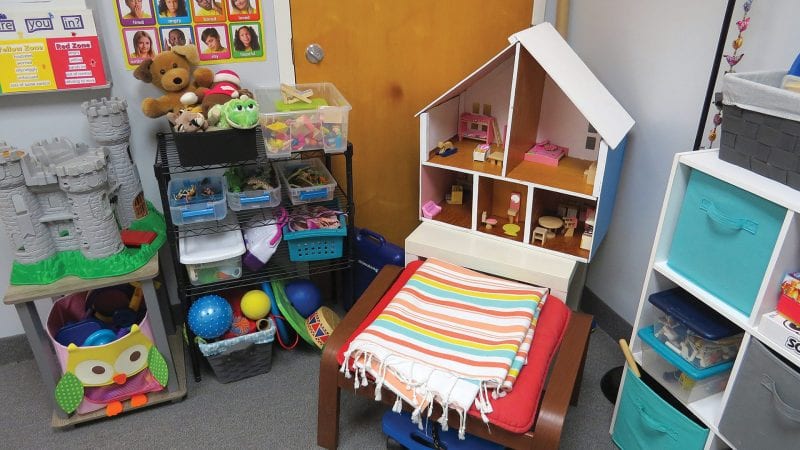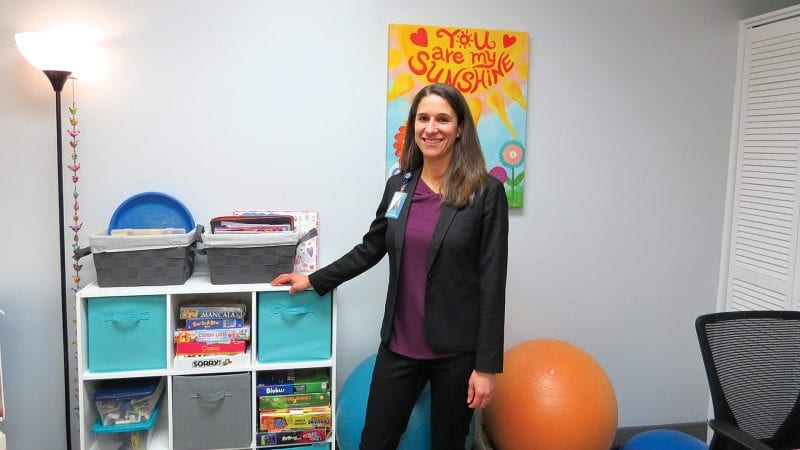RVCC Fills a Gap with School-based Mental Healthcare
Helping Those Who Need It Most
By LAURA GRANT
Any conversation around mental health is complicated — doubly so when referring to students. Yet, it’s a critical conversation, as more children and adolescents are struggling with anxiety and high stress than ever before.
For many families, issues with cost, scheduling, waiting lists, and transportation can prevent their children from getting the help they need. River Valley Counseling Center (RVCC) in Holyoke recognizes that struggle and aims to prevent it by bringing counselors directly into regional elementary, middle, and high schools.
“The need is there, and more people are starting to recognize that River Valley offers this service,” said Alexa Mignano, director of school-based clinical services for RVCC. “We have a structure in place to make sure that we’re providing quality services for the districts.”
With offices in Holyoke, Chicopee, Springfield, and Easthampton, RVCC is an outpatient mental-health provider offering individual, family, and group-therapy programs. These are geared toward both children and adults, but Mignano acknowledged that those under 18 face more difficulties when accessing therapy. Often, the logistics are so complicated that it prevents children from receiving care at all.

To counter that reality, RVCC’s school-based program provides clinician services to all K-12 schools within the Chicopee, Easthampton, Hatfield, and Holyoke districts, as well as certain schools in Amherst, East Longmeadow, Granby, Hadley, and Springfield. The clinicians have dedicated office space within these schools, where students meet for 45-minute appointments once a week. The number of students enrolled ranges depending on the size and demands of the specific school — some may see around 10 students a week, while others see 50 or more.
“The need is there, and more people are starting to recognize that River Valley offers this service,” said Alexa Mignano, director of school-based clinical services for RVCC. “We have a structure in place to make sure that we’re providing quality services for the districts.”
The initiative began in Holyoke, where RVCC originated, around 20 years ago. From there, it branched out and worked its way through different regional school systems. The expansion process was slow at first, but now, Mignano noted, two to three new schools join every year — mostly at the request of the schools themselves. Administrators often learn about the program through word of mouth and reach out to request more information and discuss a possible partnership.
Before RVCC officially signs on, all school administrators meet with Mignano to address any questions or concerns. Cost is not one of them — the insurance-driven service does not cost the school any additional money. Meanwhile, it’s a win for parents, who may otherwise struggle to find a qualified clinician or have to travel along way for appointments.

Enrollment in the program can be at the request of the parents or the child, but since the vast majority of students are under 18 years old, clinicians are required to speak with a child’s family before beginning therapy. Much like the sessions themselves, this process is intended to be flexible. Clinicians may organize an introductory phone call or meet with families outside regular business hours. Beyond simply being a legal matter,Mignano said, the providers want to take a well-rounded approach to care by connecting with those closest to the student.
Long-term Approach
These sessions are meant to be long-term, centered around creating goals and objectives to address concerns head-on. From managing test anxiety to ADHD to coping with a lifetime of trauma, students have a wide range of struggles, and RVCC’s program is meant to deal with this wide spectrum. Every case, much like every child, is unique, Mignano told HCN.
Emily Myer, a clinician working at an elementary and middle school within the Easthampton district, stressed this idea. “Children are so dynamic and complex, and the clinicians at RVCC strive to provide individualized treatment,” she said. “That said, some general issues are anxiety, depression, behaviors connected to big feelings, adjusting to big life changes, school- and family-related stress, peer issues, and trauma.”
In all cases, Mignano said, “what is happening for that child is impacting their ability to either access their education fully, or it’s impacting their ability to function well socially, or it’s impacting their ability to interact appropriately at home.”
This individualized approach permeates nearly every aspect of the program. If a student shows behavioral problems in the classroom, their clinician will work with teachers and staff to determine a specific treatment plan. While every provider is given an office at these schools, the way they’re furnished varies — it may be filled with toys for younger children or include beanbag chairs for teenagers. Students are pulled out of class for 45-minute weekly sessions, at a time that impacts their academics the least, Mignano noted. For example, students would not be pulled out of a core class such as math or English.
“It’s 45 minutes out of their 30-hour school week, so it’s a relatively small percentage of their time,” she said. “The kids are needing this service in order to be well. If their mental health is more stable, then they will access their education more frequently and be more present in their classes.”
After all, the benefits of these weekly sessions are numerous. The barriers young people face when trying to receive mental healthcare can feel insurmountable. And with sessions taking place during the school day, parents don’t have to worry about transportation and scheduling — or spending months on a waiting list before being able to meet with a counselor. These barriers can alter whether or not someone receives care, so simplifying the process allows for more children to receive the help they desperately need.
“It’s 45 minutes out of their 30-hour school week, so it’s a relatively small percentage of their time. The kids are needing this service in order to be well. If their mental health is more stable, then they will access their education more frequently and be more present in their classes.”
This is also why the program specifically addresses pre-adolescents. Mental healthcare for young people is usually associated with older students, but Mignano says it’s crucial to start counseling services at a young age — not only to address issues earlier, but also to create a continuous support system for students as they move through their school years.
Dr. Elaine Campbell, RVCC’s senior director of outpatient services, emphasized the importance of the in-school program. “There are so many people in need of mental-health assistance,” she said. “In-school counseling is sometimes considered less than therapy, but it isn’t. These kids would never get services without it, so how can it be ‘less than’?”
Another major struggle for any mental-health provider surrounds patients’ own internal stigma — or the fear of being targeted by others. Mignano acknowledged that, in certain schools, there is an air of hesitance when the program first begins. But this quickly breaks down over time, she said, and these initially reluctant schools will quickly have students requesting to set up appointments.
Beyond High School
This enthusiasm is shared by the clinicians as well. Much of Myer’s background has centered around working with children and families, so the school-based program is a perfect fit for her.
“I enjoy working with children in this impactful setting, right then and there,” she said, “to support them in whatever is going on for them — whether it’s issues related to home or family, classroom dynamics, peer relationships, identity development, challenges with their learning experience, processing past ruptures and traumas, or moments of delight and success sprinkled throughout the school day.”
While most of this initiative deals with K-12 schools, three years ago, RVCC expanded to the college level and partnered with Springfield Technical Community College (STCC), with Campbell primarily in charge of coordinating it. After speaking with David Forton, STCC’s senior academic counselor, RVCC agreed there was a need for on-campus services for students.
Much like the other schools, students speak with clinicians in a dedicated, on-campus office space, while the clinicians take an individualistic approach to their sessions. Of course, STCC students are in an older (and much wider) age bracket, so some of their concerns — like being a first-generation college student — are unique. Still, the core of the program is the same: River Valley wants to bring mental healthcare directly to where it’s needed most.
Myer said it’s crucial to make mental-health resources available to young people. “It offers them skills, internal and external resources, a sense of community and caring, and a positive experience of processing their lived experience that they will take with them into the next chapter of life and beyond,” she told HCN.
Of course, finding a sense of mental well-being can take a lifetime to achieve. If children can begin those conversations as they grow, then they can enter adulthood more confident, more self-assured, and more prepared — all by making the process far more accessible.


